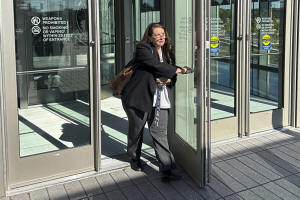Researcher who has distorted voter data appointed to Homeland Security
election integrity role
[August 27, 2025]
By ALI SWENSON
NEW YORK (AP) — A conservative election researcher whose faulty findings
on voter data were cited by President Donald Trump as he tried to
overturn his 2020 election loss has been appointed to an election
integrity role at the U.S. Department of Homeland Security.
Pennsylvania activist Heather Honey is now serving as the deputy
assistant secretary for election integrity in the department’s Office of
Strategy, Policy and Plans, an organizational chart on its website
shows.
The political appointment, first reported by Democracy Docket, shows how
self-styled election investigators who have thrown themselves into
election conspiracy theories since 2020 are now being celebrated by a
presidential administration that indulges their false claims.
Her new role, which didn’t exist under President Joe Biden, also comes
as Trump has used election integrity concerns as a pretext to try to
give his administration power over how elections are run in the U.S.
The president has ordered sweeping changes to election processes and
vowed to do away with mail ballots and voting machines to promote
“honesty” in the 2026 midterms, despite a lack of constitutional
authority to do so. Trump’s Department of Justice also has demanded
complete state voter lists, raising concerns about voter privacy and
questions about how the federal government plans to use the sensitive
data.
Neither Honey nor DHS immediately responded to requests for comment on
Tuesday.

Honey runs an investigations and auditing consulting firm called
Haystack Investigations, according to contact information provided on
her LinkedIn profile. Since 2020, she also has led a variety of election
research groups whose flawed analyses of election data have fueled
right-wing attacks on voting procedures, including in battleground
states Pennsylvania and Arizona.
In 2020, her election research misrepresented incomplete state voter
data to falsely claim that Pennsylvania had more votes reported than
voters. Trump echoed the falsehood during his speech to supporters on
Jan. 6, 2021, saying Pennsylvania “had 205,000 more votes than you had
voters.” Shortly after, his supporters violently attacked the U.S.
Capitol in an effort to prevent Biden from becoming president.
In 2021, Honey was involved in the Arizona Senate’s partisan audit of
election results in Maricopa County, she confirmed in a podcast
interview with a GOP lawyer. That review in the state's most populous
county, which spent six months searching for evidence of fraud, was
described by experts as riddled with errors, bias and flawed
methodology. Still, it came up with a vote tally that would not have
altered the outcome, finding that Biden actually won by more votes than
the official results certified in 2020.
In 2022, Honey’s organization Verity Vote issued a report claiming that
Pennsylvania had sent some 250,000 “unverified” mail ballots to voters
who provided invalid identification or no identification at all.
[to top of second column]
|

Heather Honey, a conservative election researcher, leaves the
federal courthouse in Harrisburg, Pa., Oct. 18, 2024. (AP Photo/Mark
Scolforo, File)

Officials in Pennsylvania said the claim flagrantly misrepresented
the way the state classified applications for mail-in and absentee
ballots. The “not verified” designation did not mean the voter
didn’t provide accurate identification information, nor did it mean
their ID wasn’t later verified.
Former Maricopa County Recorder Stephen Richer said he received
dozens of public records requests related to elections from Honey
during his time in office, which took up “scores of hours of staff
time.” He said he was surprised to hear she had been elevated to a
position of such “authority and responsibility.”
From what he saw, Richer said, she’s “not a serious auditor.”
Honey's hiring at the Department of Homeland Security comes amid
reports that Trump's administration has met with several other
election conspiracy theorists in recent months. Mike Lindell, the
founder of MyPillow and one of the most prominent election
conspiracy theorists, said in an email to supporters in June that he
had met with the president twice in the previous eight weeks. In
June, a federal jury in Colorado found that Lindell had defamed a
former worker for a company that makes election equipment by making
false claims related to the 2020 election.
Seth Keshel, an election modeler whose work on the 2020 election
prompted challenges that were later dismissed, presented his
research to White House personnel in May, he said on his Substack
account.
David Becker, executive director of the nonprofit Center for
Election Innovation and Research, said DHS used to have real
credibility in its advisory role on elections. Its Cybersecurity and
Infrastructure Security Agency had collaborated with states to shore
up their elections from foreign attacks and disinformation, he said.

Now, the agency has fired its “real experts” on elections, he said.
Trump’s administration also has done away with much of its work
tracking foreign influence campaigns targeting voters, both at CISA
and the Office of the Director of National Intelligence.
“What I’m concerned about is that it seems like DHS is being poised
to use the vast power and megaphone of the federal government to
spread disinformation rather than combat it,” Becker said. “It’s
going to really harm DHS’s credibility overall.”
All contents © copyright 2025 Associated Press. All rights reserved |